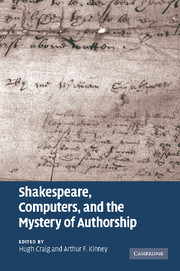Book contents
- Frontmatter
- Contents
- List of figures
- List of tables
- Notes on contributors
- Preface and acknowledgments
- 1 Introduction
- 2 Methods
- 3 The three parts of Henry VI
- 4 Authoring Arden of Faversham
- 5 Edmond Ironside and the question of Shakespearean authorship
- 6 The authorship of The Raigne of Edward the Third
- 7 The authorship of the Hand-D Addition to The Book of Sir Thomas More
- 8 The 1602 Additions to The Spanish Tragedy
- 9 Transforming King Lear
- Conclusion
- Appendix A Plays in the corpus
- Appendix B A list of 200 function words
- Glossary
- Index
- References
7 - The authorship of the Hand-D Addition to The Book of Sir Thomas More
Published online by Cambridge University Press: 06 January 2010
- Frontmatter
- Contents
- List of figures
- List of tables
- Notes on contributors
- Preface and acknowledgments
- 1 Introduction
- 2 Methods
- 3 The three parts of Henry VI
- 4 Authoring Arden of Faversham
- 5 Edmond Ironside and the question of Shakespearean authorship
- 6 The authorship of The Raigne of Edward the Third
- 7 The authorship of the Hand-D Addition to The Book of Sir Thomas More
- 8 The 1602 Additions to The Spanish Tragedy
- 9 Transforming King Lear
- Conclusion
- Appendix A Plays in the corpus
- Appendix B A list of 200 function words
- Glossary
- Index
- References
Summary
Perhaps it is the duty of Shakespeareans to suffer through periodic bouts of attribution anxiety. In the case of the Addition to The Book of Sir Thomas More such anxiety has fostered eighty years of dispute. The reason is simple. As Arthur F. Kinney notes in his ‘Text, Context, and Authorship of The Booke of Sir Thomas More’ (in which, incidentally, he argues against Shakespeare as Hand-D): ‘In all of Tudor Drama there is no more vexing text than the one ascribed on a vellum wrapper as The Booke of Sir Thomas Moore. There is none more important, either – since if we have any fragment of drama actually in Shakespeare's hand, this is it.’ These then are the stakes. To live up to them, the study of attribution requires precise methods of inquiry, which utilize but are independent of other critical approaches and their concomitant if elegantly buried hopes for a given outcome. Computational stylistics is such a method.
Computational stylistics provides a reading of text, and of authorial distinction, at a molecular level. It takes seriously the distinguishing force of both syntax (thus the importance of function words to the methodology) and vocabulary. It rouses assumptions from slumber and instantiates the possibility of deeper precision. In the case of Hand-D, computational stylistics crosses the threshold from conjecture, albeit rigorous, to probability, albeit not certain, by establishing and assuring not only a validity but a reliability unavailable to both trained literary sensibility and honed literary instinct.
- Type
- Chapter
- Information
- Shakespeare, Computers, and the Mystery of Authorship , pp. 134 - 161Publisher: Cambridge University PressPrint publication year: 2009
References
- 1
- Cited by



